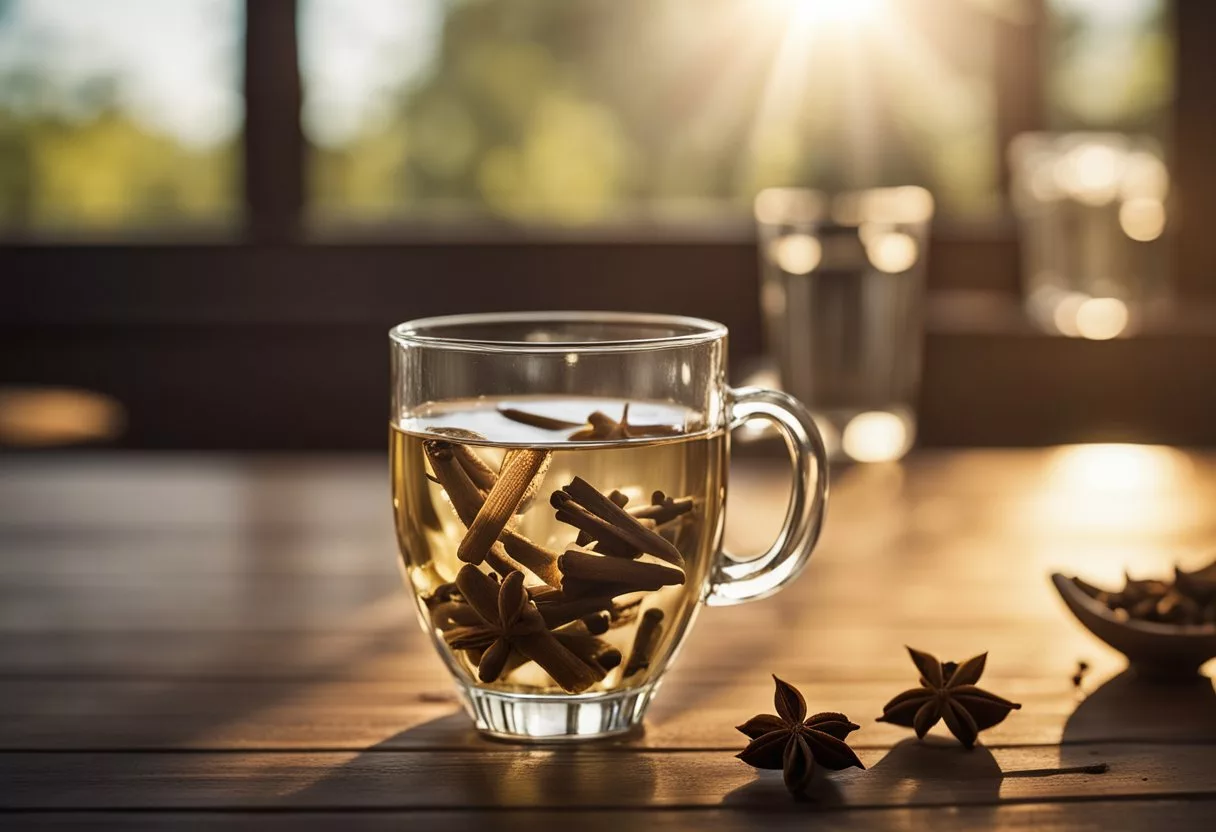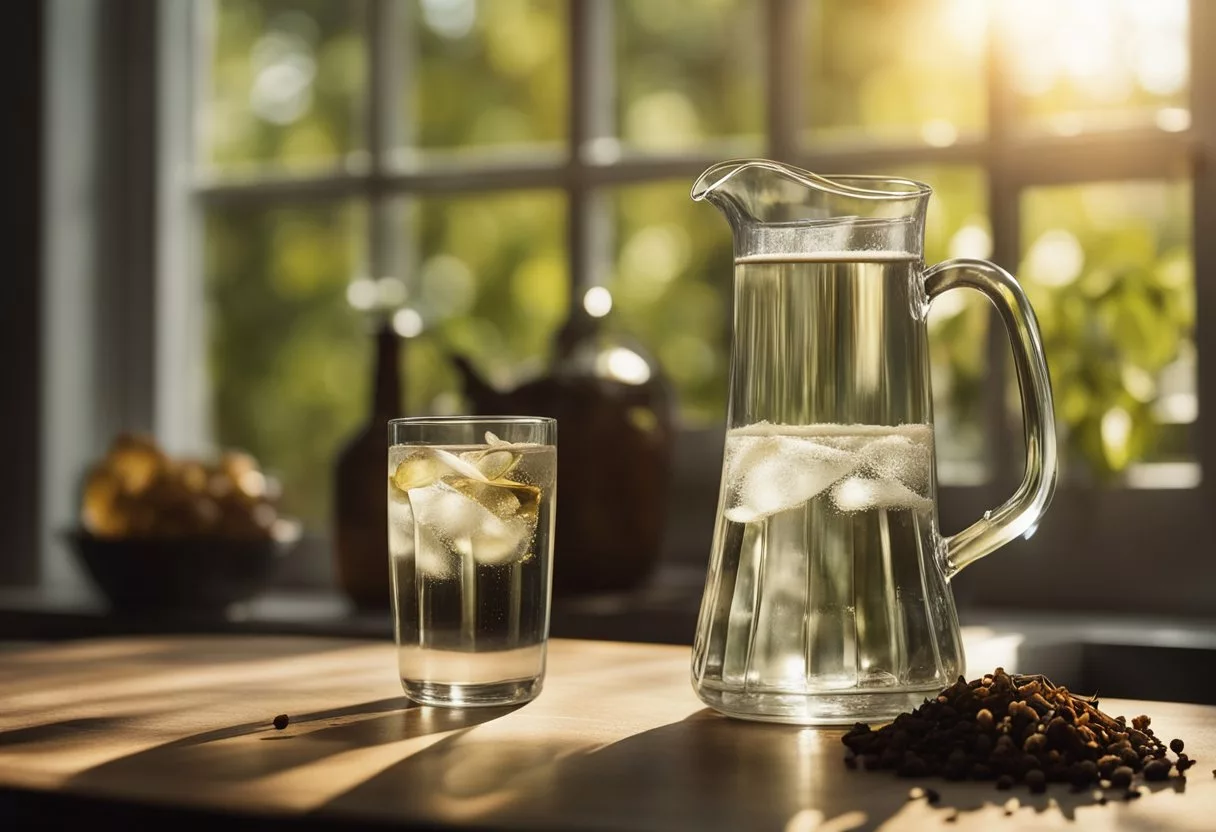Drinking water infused with cloves has been a popular practice for centuries. Many people claim that it can help improve digestion, boost the immune system, and even aid in weight loss.
Clove water is made by steeping whole cloves in water. This allows the beneficial compounds found in the spice to infuse into the liquid.

Clove water is known to be rich in antioxidants. These can help protect the body against free radical damage and reduce inflammation.
Additionally, cloves contain eugenol, a compound that has been shown to have pain-relieving properties. Regular consumption of clove water may therefore help reduce pain and inflammation in the body. This makes it a popular natural remedy for conditions such as arthritis and sore throats.
Another potential benefit of drinking clove water is that it may help regulate blood sugar levels. Studies have shown that cloves can help improve insulin sensitivity and reduce blood sugar levels, making it a promising natural treatment for diabetes.
However, more research is needed to fully understand the effects of clove water on blood sugar levels and how it can be used as an effective treatment for diabetes.
What is Clove Water?

The Basics of Cloves
Clove, also known as Syzygium aromaticum, is a spice that is commonly used in cooking due to its strong, sweet, and aromatic flavor. It is a flower bud that is dried and ground into a powder.
Cloves are rich in antioxidants, which can help protect the body from damage caused by harmful free radicals. They also have anti-inflammatory properties that can help reduce inflammation in the body.
In traditional medicine, cloves have been used to treat a variety of ailments, including toothaches, digestive issues, and respiratory problems.
Preparation of Clove Water
Clove water is a simple and easy-to-make beverage that can be enjoyed daily. To make clove water, simply add a few cloves to a glass of water and let it steep for a few minutes.
The longer the cloves steep, the stronger the flavor will be. Some people prefer to add other ingredients, such as lemon or honey, to enhance the flavor of the drink.
Clove water can be consumed hot or cold, depending on personal preference.
Drinking clove water regularly can provide several potential health benefits, including boosting the immune system, aiding in digestion, and promoting oral health.
Clove water can also help reduce inflammation in the body and may have anti-aging properties. However, it is important to note that excessive consumption of clove water can lead to negative side effects. These include an upset stomach, nausea, and vomiting.
It is recommended to consume clove water in moderation and consult a healthcare professional before adding it to your daily routine.
Nutritional Profile

Vitamins and Minerals in Cloves
Clove water is packed with essential vitamins and minerals that are beneficial for overall health.
Cloves are an excellent source of manganese, which is necessary for bone development and wound healing. They also contain vitamin K, which is important for blood clotting and bone health. One teaspoon of ground cloves offers measurable amounts of fiber, contributing to digestive health.
Caloric Content of Clove Water
Clove water is a low-calorie drink that can be enjoyed as a healthy alternative to sugary beverages. One teaspoon of ground cloves contains only six calories, making it an ideal drink for those who are trying to lose weight or maintain a healthy weight.
Clove water is also rich in potassium, which is essential for maintaining proper fluid balance in the body and regulating blood pressure.
Health Benefits

Clove water is known for its potential health benefits. Daily consumption of clove water may provide several health benefits, including:
Antioxidant Effects
Clove water is packed with antioxidants that may help fight oxidative stress and inflammation in the body.
The antioxidants in clove water may help protect the body from harmful free radicals that can cause damage to cells and lead to chronic diseases.
Anti-Inflammatory Properties
Clove water contains eugenol, a compound known for its anti-inflammatory properties.
Studies have shown that eugenol may help reduce inflammation in the body, which can help alleviate pain and other symptoms associated with inflammatory conditions.
Blood Sugar Regulation
Clove water may help regulate blood sugar levels in the body.
Studies have shown that the compounds in cloves may help improve insulin sensitivity and glucose uptake. This can help regulate blood sugar levels and reduce the risk of developing diabetes.
Digestive Health
Clove water may aid in digestion and relieve digestive discomfort.
The compounds in clove water may help stimulate the production of digestive enzymes and improve the absorption of nutrients in the body.
Clove water may also help relieve symptoms of indigestion, such as bloating and gas.
Oral Health Support
Clove water may promote oral health and help prevent dental problems.
The compounds in clove water may help reduce inflammation and pain associated with dental problems. Clove water may also help fight oral bacteria that can cause bad breath and other dental issues.
Immune System Boost
Clove water may support a healthy immune system.
The antioxidants and anti-inflammatory compounds in clove water may help boost immune function and reduce the risk of developing infections and other illnesses.
Specific Uses in Traditional Medicine

Clove Water in Asian Remedies
Clove water has been used in traditional Chinese medicine for centuries due to its various health benefits.
In TCM, it is believed that cloves have a warming effect on the body, which can help to promote circulation and reduce pain.
Clove water is commonly used to treat digestive issues such as bloating, gas, and nausea. It is also believed to have antibacterial properties, which can help to fight off infections.
In Indonesia, clove water is used as a natural remedy for toothaches.
The eugenol present in cloves has a numbing effect on the nerves, which can help to reduce pain.
Clove water is also used to treat respiratory issues such as coughs and colds. It is believed that the antibacterial and anti-inflammatory properties of cloves can help to soothe sore throats and reduce congestion.
Clove Water in Western Folk Medicine
Clove water has a long history of use in Western folk medicine as well.
In Europe, it was commonly used to treat digestive issues such as flatulence and indigestion. It was also used as a natural remedy for toothaches and other oral health issues.
In North America, clove water was used by Native American tribes to treat a variety of ailments, including headaches, colds, and toothaches. It was also used as a natural insect repellent.
Potential Side Effects

Clove water has several potential side effects that you should be aware of before consuming it regularly. While clove water is generally safe for most people, it can cause adverse reactions in some individuals.
Liver Considerations
Clove oil has been linked to liver damage in some cases, but it is unclear whether clove water poses the same risks.
According to Drugs.com[1], clove is likely safe when used as a food product. However, it may produce unwanted effects on the body when used as a medicinal product.
If you have a liver condition or are taking medication that affects your liver, you should talk to your doctor before consuming clove water regularly.
Blood Thinning Potential
Clove water may have blood-thinning potential, which can be dangerous for individuals with bleeding disorders or those who are scheduled for surgery.
According to 7hol.com[2], clove water can interfere with blood clotting and increase the risk of bleeding.
If you have a bleeding disorder or are scheduled for surgery, you should avoid consuming clove water.
Risks During Pregnancy and Breastfeeding
Clove water is not recommended for pregnant or breastfeeding women.
According to WebMD[3], clove is likely unsafe when taken by mouth in medicinal amounts during pregnancy or breastfeeding.
Clove can cause seizures and liver damage in some individuals, which can be dangerous for both the mother and baby.
Allergic Reactions and Toxicity
Clove water can cause allergic reactions in some individuals, especially those who are allergic to other spices or plants in the same family as clove.
According to MedicineNet[4], clove oil can also be toxic when consumed in large amounts.
If you experience any allergic reactions or toxicity symptoms after consuming clove water, you should seek medical attention immediately.
Culinary Applications

Clove Water as a Beverage
Clove water is an excellent alternative to plain water, especially for those who don’t enjoy the taste of plain water. It is easy to make and can be consumed at any time of the day.
To make clove water, simply add a few cloves to a glass of water and let it sit for a few minutes. The longer the cloves sit in the water, the stronger the flavor will be.
Clove water can also be used in various drinks, such as chai tea. Chai tea is a popular Indian beverage that is made by brewing tea leaves with a combination of spices, including cloves.
Adding clove water to chai tea can enhance its flavor and provide additional health benefits.
Incorporating Clove Water in Cooking
Clove water can be used in various recipes to add flavor and depth. It can be added to baked goods, such as cakes and cookies, to give them a warm, spicy flavor.
It can also be used in savory dishes, such as stews and curries, to add a unique flavor profile.
When using clove water in cooking, remember that a little goes a long way. Too much clove water can overpower the dish and make it unpalatable. It is best to start with a small amount and add more as needed.
Summary of Benefits and Cautions
Drinking clove water every day can provide a variety of potential benefits. These include boosting the immune system, aiding digestion, promoting oral health, and fighting inflammation.
Cloves are packed with antioxidants, which can help fight oxidative stress and inflammation in the body. They also contain immune-boosting compounds, such as vitamin C and antioxidants, which can enhance the body’s defense against infections and illnesses.

However, it is important to exercise caution when consuming clove water. Cloves contain eugenol, which can be toxic in large doses. Consuming too much clove water may cause stomach upset, nausea, vomiting, or diarrhea. Additionally, cloves have blood-thinning properties, so people who are taking blood-thinning medications should avoid consuming large amounts of clove water.
Recommendations for Consumption
To reap the benefits of clove water without experiencing adverse side effects, it is recommended to consume it in moderation. A safe amount of clove water to drink per day is 1-2 cups.
It is also important to consult with a healthcare professional before incorporating clove water into your daily routine. This is especially important if you are taking any medications or have any underlying health conditions.
Overall, drinking clove water can be a healthy addition to your diet, but it is important to consume it responsibly and in moderation. By following these recommendations, you can potentially enjoy the benefits of clove water without any negative side effects.
References
- Clove Uses, Side Effects & Warnings. https://www.drugs.com/mtm/clove.html Accessed October 20, 2025
- 7hol.com. https://7hol.com/side-effects-of-drinking-clove-water/ Accessed October 20, 2025
- Cloves: Health Benefits, & Uses. https://www.webmd.com/diet/health-benefits-cloves Accessed October 20, 2025
- 11 Health Benefits of Eating Cloves Daily. https://www.medicinenet.com/the_11_health_benefits_of_eating_cloves_daily/article.htm Accessed October 20, 2025
